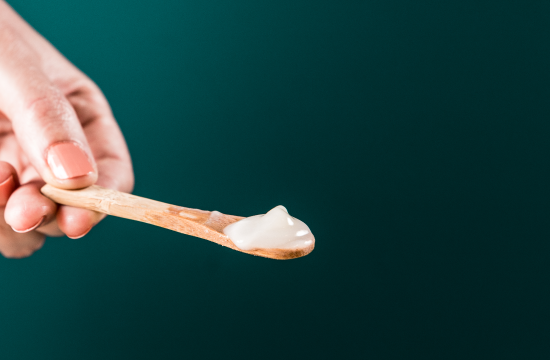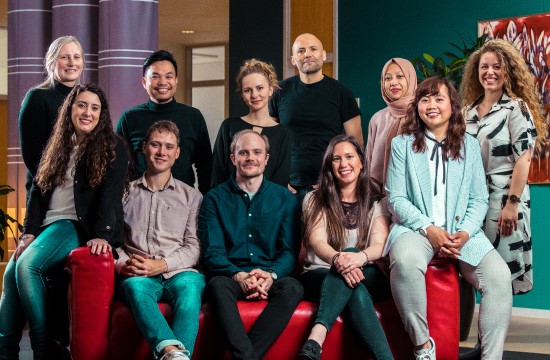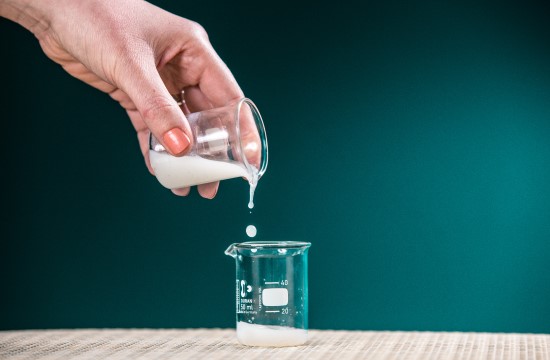From a university idea to successful business
Isabel Alvarez-Martos (CEO and co-founder of CELLUGY) was a researcher in the field of chemistry at Aarhus University, where she met another researcher, Deby Fapyane (CSO and co-founder of CELLUGY). Motivated through a university challenge, they proposed the idea that biocellulose could be used as a packing material, which was inspired by their shopping trips to the supermarket, where huge amounts of goods packed in single-use plastics are sold every day. Their idea succeeded in the university challenge, so Isabel and Deby decided to found CELLUGY and turned their idea into reality in 2018. They teamed up with a friend who has a background in business and began applying for different grants and competitions in Denmark and the EU. In 2019, the start-up presented their innovation at the Ocean Plastic Innovation Challenge organized by the National Geographic and Sky Ocean Ventures, where they gained their first investor, Sky Ocean Ventures. Shortly after, they obtained a grant from the Novo Nordisk BioInnovation Institute, followed by a grant from the EU Horizon 2020 for nearly 2.4 million euros, which started this year in April. The international start-up team now consists of 11 people from various backgrounds, with over 60% female participation.
Biocellulose from surplus sugars
The product of CELLUGY was named EcoFLEXY and is based on bacterial nanocellulose produced by the fermentation of surplus sugar by specific microorganisms. The start-up uses surplus sugar from sugar producers, giving sugar producers the possibility of other high end uses for their waste production, so they do not require an extensive crop to produce EcoFLEXY. CELLUGY is also constantly exploring other sustainable carbon sources for their production, as raw material sourcing and diversification is important for EcoFLEXY especially considering the wide range of applications. One of the applications is as a barrier coating for paper and board to replace fossil-based coatings, as often paper-based packaging has a coating with a plastic component, making the entire packaging a multi- layer material that cannot be recycled. When the plastic component is replaced with EcoFLEXY, the entire material becomes a mono material, because EcoFLEXY and paper have the same base material – cellulose. “In that way, a huge portion of unrecycled materials and packaging can be redirected to the current waste stream for recycling. That was one of our central targets, because we don't want to create a material that also needs a huge technology development in another part of the value chain, such as at the end of life. It's important to be able to adapt new and improved materials to current technologies,” Isabel explains. Furthermore, EcoFLEXY works as a strengthener for paper and pulp fibers in the paper processing, resulting in an end product that is approximately two times stronger than regular paper, according to preliminary testing. EcoFLEXY can also be used as a rheological modifier to replace several fossil-based products currently used in beauty or skincare products, making them more sustainable and less harmful to health and skin overall. EcoFLEXY contains no microplastics because it is made entirely of biocellulose. Aside from that, it is recyclable and biodegradable. It also comes in a waterborne suspension, which means that the suspension is water-based and contains no volatile organic compounds. In addition, CELLUGY's material has a CO2 footprint that is at least 80% lower than that of its fossil-based counterparts. “We try to consider every step of our material lifecycle in order to make it environmentally friendly. We like to say, "to make it in-tune with the environment." And that is also part of the concept, because we are attempting to mimic natural processes to create materials for use in man-made products,” adds CELLUGY's founder.
Next up at CELLUGY
The startup is currently working on scaling up production, and with a grant from the European Innovation Council (EIC) under Horizon 2020, they plan to build their first pilot plant and enter the market in 2023. The start-up is currently focusing on collaboration in the field of specialty papers and personal care, with plans to expand into other markets in the future. CELLUGY, who joined the ISC3 Global Start-up Service in February 2021, actively contributes to SDG 9 (industry, innovation, and infrastructure), SDG 12 (responsible consumption and production), SDG 13 (climate action), SDG 14 (life below water), and SDG 17 (partnerships for the goals).




